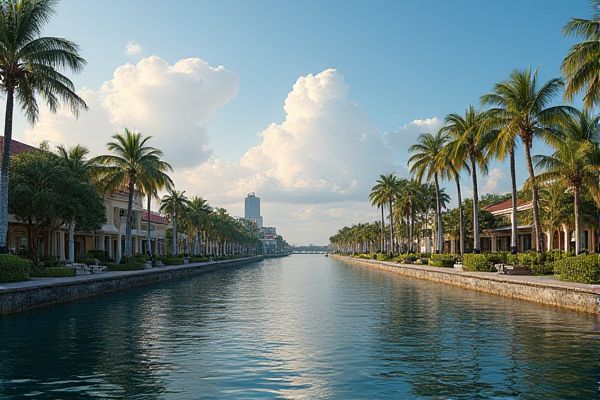
Internet and telecommunications options in Florida: Major ISPs: Comcast, AT&T, Spectrum. Fiber internet availability varies by region. Average speeds: 100-300 Mbps. 5G coverage expanding in urban areas. Satellite internet in rural areas. Statewide telecommunications infrastructure upgrades ongoing. VoIP services widely available. Extensive Wi-Fi hotspots in cities. Competitive mobile plans from major carriers. No state-imposed internet restrictions.
Major ISPs: Comcast, AT&T, Spectrum.
In Florida, major ISPs include AT&T Fiber, which is the best option due to its affordable plans and fast speeds up to 5,000Mbps, though it's not universally available. Other notable providers are Xfinity, offering cable plans starting at $35 for 150 Mbps, and Spectrum, which provides cable plans with speeds up to 1,000Mbps starting at $30 per month. For more detailed information, you can visit the Best Internet Providers In Florida page for additional insights and options tailored to this region.
Fiber internet availability varies by region.
Fiber internet in Florida is accessible in numerous regions, with providers like Metronet offering 100% fiber internet in locations such as Altamonte Springs, Apopka, Daytona Beach, Deltona, and Orlando, among others. However, availability and coverage can vary significantly by region, with some areas enjoying a choice of multiple fiber providers while others may have limited or no fiber options.
Average speeds: 100-300 Mbps.
In Florida, for average internet speeds ranging from 100 to 300 Mbps, providers such as Xfinity, Frontier, and Spectrum offer a variety of plans that fall within this bandwidth. Xfinity's offerings begin at a competitive rate of $35 for 150 Mbps, providing a balance of speed and affordability. Meanwhile, both Frontier and Spectrum also have diverse plans reaching speeds up to 300 Mbps, catering to different consumer needs across the state. For more details on these internet providers, you can visit CNET.
5G coverage expanding in urban areas.
Florida's 5G coverage is robust in urban areas such as Miami, Orlando, and Tampa, with major carriers actively expanding their 5G networks, while rural areas are also seeing improvements in cell phone and internet coverage. For more detailed information about coverage areas and updates, visit this Dead Cell Zones page. This expansion ensures that both urban and rural communities benefit from enhanced connectivity.
Satellite internet in rural areas.
Satellite internet is a crucial option for rural areas in Florida, with providers like Starlink, HughesNet, and Viasat offering coverage across the state. These services provide speeds ranging from 12-2200Mbps, although they may come with higher costs and potential issues like data caps and weather interference. To explore more about these services, you can visit the Highspeedinternet website, which offers detailed information on internet providers in rural regions.
Statewide telecommunications infrastructure upgrades ongoing.
The Biden-Harris Administration has allocated over $1.1 billion to Florida through the Broadband Equity, Access, and Deployment (BEAD) program to deploy or upgrade broadband networks, ensuring reliable and affordable high-speed Internet access, particularly in rural communities, and supporting workforce development and infrastructure expansion.
VoIP services widely available.
South Florida VoIP offers cost-effective and tailored VoIP solutions, including hosted VoIP, SIP trunks, and broadband internet, specifically catering to small businesses in the Miami, Fort Lauderdale, and Pompano Beach areas, with a focus on bill auditing and ensuring clients are not overcharged for their telecom services. Meanwhile, Nextiva provides a comprehensive VoIP phone system with advanced features, unlimited calling minutes, and integration with CRM and other software, offering scalable and affordable solutions for businesses of all sizes. Furthermore, GoodFirms lists several top VoIP service providers in Florida, including Streamline Voice & Data, ComRes, Inc., and United World Telecom, offering a range of VoIP services, internet solutions, and telecommunications support tailored to various business needs across different regions in Florida.
Extensive Wi-Fi hotspots in cities.
Florida offers extensive Wi-Fi hotspots across its major cities, including Orlando, Tampa, Miami, West Palm Beach, and Tallahassee. These hotspots are available in various locations such as cafes, restaurants, railway stations, parks, and other public areas, ensuring widespread internet access throughout the state. For more detailed information on free Wi-Fi hotspots in Florida, you can visit the PureVPN website, which provides insights into the availability of Wi-Fi across different regions. With such a robust network, staying connected in Florida has never been easier.
Competitive mobile plans from major carriers.
In Florida, major carriers offer competitive mobile plans with various options. For example, AT&T, T-Mobile, and Verizon provide unlimited data plans with prices starting at around $65 per month, while smaller carriers like Consumer Cellular and Cricket Wireless offer more affordable plans with limited data starting at $35-$40 per month. Additionally, MVNOs like Mint Mobile and Red Pocket provide cost-effective alternatives using the major carriers' networks.
No state-imposed internet restrictions.
Florida boasts a wide array of internet service options without any state-imposed restrictions, allowing residents to choose from a diverse range of providers. These include the latest in fiber, cable, DSL, and 5G technology. Prominent providers such as AT&T, Xfinity, and Frontier offer a multitude of plans tailored to different needs. For a detailed analysis of the best options available, you can visit the Best Internet Providers in Florida on CNET, which highlights and compares the top offerings in the state.
